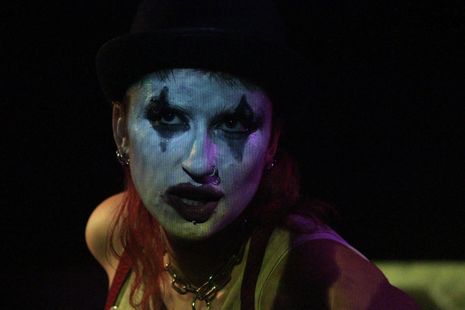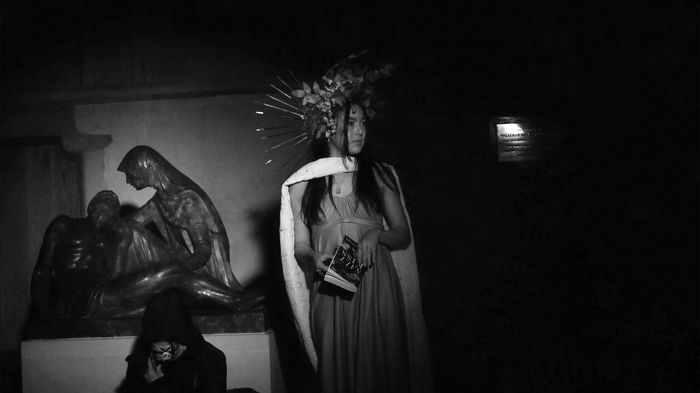Hitler at the ADC? These guys pull it off
A Bright Room Called Day is a stylish, thought-provoking piece that deserves your attention

We’re all Cambridge students. We all know how the middle of term feels. A sizeable number of us shuffle around college and lecture theatres with deadlines calcifying our whip-sharp wits. I think these academic tribulations may have been reflected in the relatively scant audience for the opening night of this week’s ADC mainshow. What’s to be done? It may not seem like light relief from the impending week 5 blues to go and watch a play of historical polemic like Tony Kushner’s A Bright Room Called Day. But this is a show whose writing and direction, under the immensely well-hewn hands of Wilf Offord, enlivens the incel’s favourite historical period into something beautifully poignant; a domestic tragedy that gulps deeply from the vicissitudes of history and muses, repeatedly, on the seeming futility of art in the midst of political bedlam.
First of all, it must be said that Kushner is a fantastic writer. There is so much beautiful language in this play, and it gives its actors so many chances to exhibit wonderful poetry. And boy, do they take them. Bright Room is a masterpiece in casting: Offord has assembled a fantastically balanced, complementary company. Each actor’s natural proclivities fit snugly into the demands of the characters written for them by Kushner. What a gorgeous Cambridge theatre debut for Tanya Gupta, who leads the line deftly as the soft, naive, instantly likeable Agnes, struggling to make a living as an actress in early-30s Berlin. Her support is equally terrific. Rob Monteiro (who has almost as many Camdram credits as there are stars in the firmament) is the play’s best communicator, pronouncing some beautiful sentiments with a studied cadence as psychoanalyst Baz.
“Each actor’s natural proclivities fit snugly into the demands of the characters written for them by Kushner”
Another triumphant debutant is Mimi Kaur Ronson as the flamboyantly coquettish Paulinka, a similarly powerful orator and navigator of text. With these characters (with a capital C) in train, Agnes can afford to take an oracular backseat, surrounded by grizzled veterans of German political struggle who impose upon her that which she never fully incorporates as her own. The chief of these veterans is Husz, played by Emma Lewis. Husz is privileged with having one of the best meta-artistic routines in the play, one that Lewis conveys superbly by drawing on a fantastic command of somatic gesture.
The whole narrative is figured through the perspective of Zillah, a young radical observing the events as history from the Reagan period. This production cleverly interlaces more contemporary references to the demagogues of our time in a way that I thought was funny and artful, rather than affectatious. Yes, I clocked the JK Rowling poster. Esther Crasnow-Dodd’s portrayal of Zillah is skilful; reeling us in by positioning Zillah at the extreme downstage and giving her a quiet, distinctive inflection that offers a genuine counterpoint to the more straightforward naturalism of the scenes from Germany.
“This production cleverly interlaces more contemporary references to the demagogues of our time”
Speaking of naturalism, this play certainly departs from it. Batya Reich is perfectly suited to the role of the mystical, ephemeral Die Alte – I would happily watch a play in which Reich’s Die Alte was the only object. Likewise, Helen Brookes and Phoebe Tompkins add an effective comic strain as a pair of hapless communist reactionaries. Their contribution reminded me of Dr Bunsen Honeydew and Beaker in The Muppet Christmas Carol; bumbling, tripping over themselves, yet somehow at the core of the distinctly human tragedy of the time that this play reconjures. Tompkins reappears later in a different, much cooler guise, with a unique link to the colour red which came to be something of a reoccurring motif throughout. Credit to the lighting team led by Jamie Benson; I thought it was very well done, all the more striking because it was used so sparingly.
Now the niceties are out of the way, we come to TBT. TBT, for the uninitiated, is The Big Test: can you see and hear everyone, at all times, during the show? Yes. Just. I did initially think projection was going to be an issue in this play. It began very quietly, very demurely. I had to strain my ears in its opening moments to hear snatches of dialogue. Occasionally actors would address others whilst their face was turned more than ninety degrees away from the audience: a cardinal sin that I think you can only break in extremely well-justified circumstances. However, my fears were soon calmed. There was a notable pick up in both energy and volume after the first few scenes, once the thespianic blood got pumping, and by the time the second half rolled around, it had ceased to be an issue.
Altogether, this was a fantastic choice of a play done well. Chapeau Offord. This play deserves to get far more bums on seats than it did on opening night. Go and watch it. Bright Room may not offer masses of encouragement for our present moment, but I certainly did not feel lectured at, nor that I was sitting in another supervision. Fear not, my friends, we will get through this. Bright things are on the horizon. Big, world-changing ideas are back in fashion. Let’s pray to the great god Zohran that we pick the right ones.
A Bright Room Called Day is running at the ADC Theatre from Tuesday 4th November – Saturday 9th at 7:30 pm.
 News / Judge Business School advisor resigns over Epstein and Andrew links18 February 2026
News / Judge Business School advisor resigns over Epstein and Andrew links18 February 2026 News / Gov grants £36m to Cambridge supercomputer17 February 2026
News / Gov grants £36m to Cambridge supercomputer17 February 2026 News / Union speakers condemn ‘hateful’ Katie Hopkins speech14 February 2026
News / Union speakers condemn ‘hateful’ Katie Hopkins speech14 February 2026 News / CUCA members attend Reform rally in London20 February 2026
News / CUCA members attend Reform rally in London20 February 2026 News / Right-wing billionaire Peter Thiel gives ‘antichrist’ lecture in Cambridge6 February 2026
News / Right-wing billionaire Peter Thiel gives ‘antichrist’ lecture in Cambridge6 February 2026










